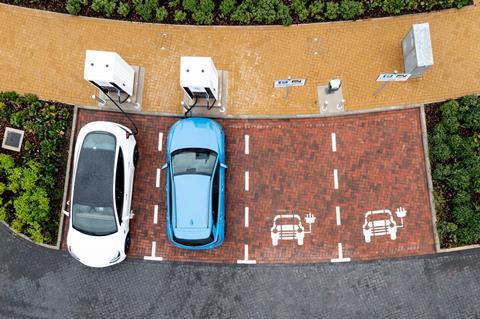
East Ayrshire Council is introducing tariffs and overstay charges for public EV charging points in East Ayrshire from April1. The council said this was in response to rising energy costs but also because the current free or below-cost EV charging was deterring private sector investment.
The Council has been responsible for installing and operating charging points since 2015. There are currently 65 points in 36 locations across East Ayrshire and increased demand for these has resulted in higher running costs for the Council.
A report by Scottish Futures Trust has said that given the fact that more people are purchasing EVs, a market rate should be introduced to maintain and expand a “high quality customer-focused network across the whole of Scotland”. This expansion will be required to meet the Scottish Government’s target of phasing out the need for new petrol and diesel cars and vans by 2035.
To deliver the thousands of additional EV charging points necessary over the next five to 10 years, it is estimated that £300m to £400m of new investment will be required and most of this will need to come from the private sector. The current free or below-cost EV charging by local authorities is, however, apparently deterring this private sector investment.
Starting on April 1, 2024, the charging tariff will be set at:
• Fast/AC (7kW): £0.31 per kWh
• Fast/AC (22kW): £0.31per kWh
• Rapid/DC (50kW): £0.37 per kWh
An overstay charge will also be introduced to help reduce congestion on rapid chargers. The overstay charges will be:
• Fast/AC: £30 after the first five hours plus 10 minutes grace between 8am and 10pm
• Rapid/DC: £30 after the first hour plus 10 minutes grace between 8am and 10pm
There will also be a minimum spend of £5 at charging points to ensure that EV charger users only access the charge facility to draw a minimum of 18kWh of electricity when they do need to charge.
The Council said the East Ayrshire tariff is lower than the average local authority rate of 50p for a rapid charging station, although this figure fluctuates across local authority areas.
Councillor Jim McMahon, cabinet member for housing, transport and communities, said: “It’s great to see that the demand for EVs is on the rise and that so many car owners are making the shift to electric. However, providing free EV charging is no longer financially viable for the Council and it’s also preventing private sector investment. This investment is needed if we are to expand the charging network and ultimately achieve our goal of reducing transport emissions and reaching the Council’s net zero target.
“By introducing the tariffs, we can recover the cost of energy, ensure effective maintenance of the points for our residents and visitors, and help to reduce congestion at our busier charging points.”
































